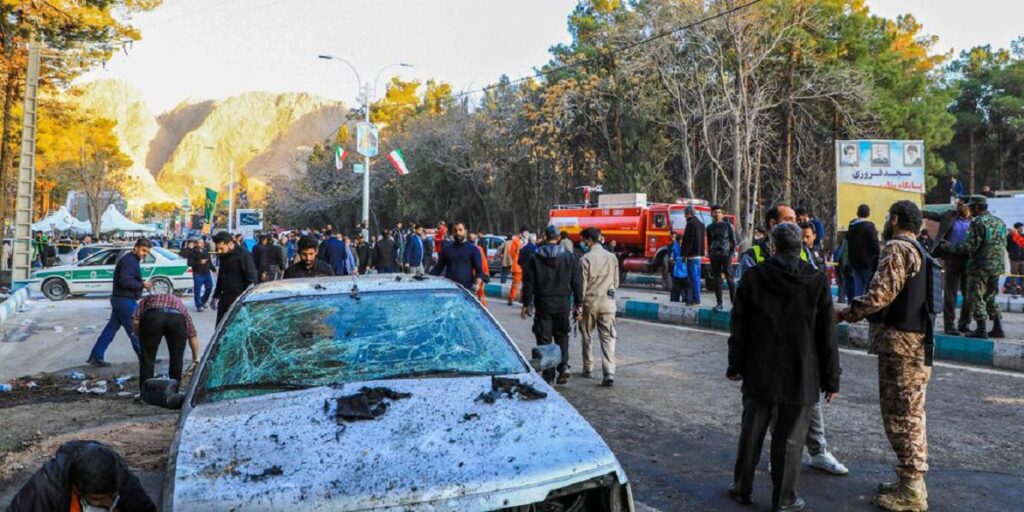By Ida Sargsyan and Anton Evstratov
On January 3, two explosions took place at the Gulzar Sheridan Cemetery in the city of Kerman, where a memorial ceremony was held in honor of the former commander of the IRGC’s Al Quds unit, General Qasem Suleimani, who was killed on this day in 2020. According to official figures, 84 people were killed and hundreds were injured.
The country’s authorities immediately called what happened a terrorist attack, and the country’s President Ibrahim Raisi in his speech accused Israel of organizing it.
The US, in turn, did not consider the involvement of its ally and said that the style of the terrorist attack was more similar to the “Islamic State”. The media consider other versions of those responsible for the crime, in particular, the “Organization of the Mujahedin-e Khalq” (Mojahedin-e Khalq), Baloch separatists who operate in the neighboring province of Sistan and Baluchistan, etc., and other versions. However, based on the experience of previous terrorist attacks, none of the mentioned groups has claimed responsibility for the attack, which makes it meaningless for their “struggle”. The Israeli media, on the other hand, affiliated with the authorities, make publications “hinting” at the country’s involvement. But, such publications may also be a provocation.
“Islamic State”, in its turn, 2 days after the terrorist attack, issued its own statement, which was perceived by many interested parties as an assumption of responsibility for the attack. However, this commentary does not contain the relevant language, but is merely informational material. Thus, it is premature, to put it mildly, to take it as a “recognition” of the Islamist structure.
Moreover, official Tehran openly defines the “Islamic State” as a child of Israel and the United States and a mercenary force of the latter acting in their interests.
In addition to the fact that the attack took place on the anniversary of the death of Qassem Suleimani, who made a great contribution to the fight against ISIS in Syria and Iraq, the next day was scheduled for the visit of the Iranian president to Ankara. The visit could have taken place on November 28, but it was postponed, according to the official version, because of the scheduled meeting of the UN Security Council on the Gaza issue, and the leaders were waiting for the results. After the terrorist attack, the visit was again postponed indefinitely, which suggests that the purpose of the terrorist attack could have been to disrupt the upcoming talks between Ankara and Tehran.
According to information available in the media, the main topics of the talks during the visit were supposed to be the situation in Gaza and the South Caucasus. While Turkey and Iran have fundamentally different interests in the South Caucasus, the countries are in solidarity on the Gaza issue (at least at the level of official rhetoric, since Ankara continues active trade contacts with Israel, transports energy carriers, etc.).
Recall that Tel Aviv has repeatedly accused Iran of direct support for Hamas and participation in the conflict, but the U.S. said that there is no evidence of this. Nevertheless, there are forces interested in a direct conflict between Israel and Iran, which need to drag Iran into such a war. However, Tehran has maintained a low-key policy, avoiding direct conflict and acting through proxies. Mourning has been declared in the country, but no red or black flag of revenge has been raised in Iran, the country’s foreign minister has said that Iran is taking political and legal action through the UN. This means that Iran does not intend to retaliate directly. Which is not the case with Turkey.
Ankara has been pursuing an extremely unrestrained policy in terms of foreign interventions in recent years. Turkish forces are conducting operations in Syria, Iraq, Lebanon, and participating in Azerbaijan’s military activities. Gaza may become the next point of Turkish intervention. Discussion of such a scenario at the talks between Raisi and Erdogan in Ankara cannot be ruled out.
It is also noteworthy that on the day of the terrorist attack in Iran, U.S. Secretary of State Anthony Blinken once again arrived in Tel Aviv. The outcome of this visit is still unknown, but the Western press reported that Israel “obeyed” the West and withdrew its troops from the Gaza Strip, allegedly to change the tactics of warfare. Europe also condemned Israel’s actions in Gaza in the person of the head of European diplomacy Josep Borrell, who stated that ethnic cleansing in the region was unacceptable.
It is no secret that Iran is currently one of the main partners and an important supplier of military goods for Russia, which is conducting a special military operation in Ukraine. The Islamic Republic’s involvement in its own “war” may also affect Russia’s position in the Ukrainian issue, which is in line with the interests of the United States and the West as a whole. In this connection, taking into account the close military and operational interaction between Washington and Tel Aviv, one can make an assumption about the American participation in the incident on the territory of the Islamic Republic of Iran, which does not contradict the “Israeli version” in any way.
(The opinions expressed in this article are solely those of the authors and do not reflect the views of World Geostrategic Insights).
Image Credit: Sare Tajalli/AFP







